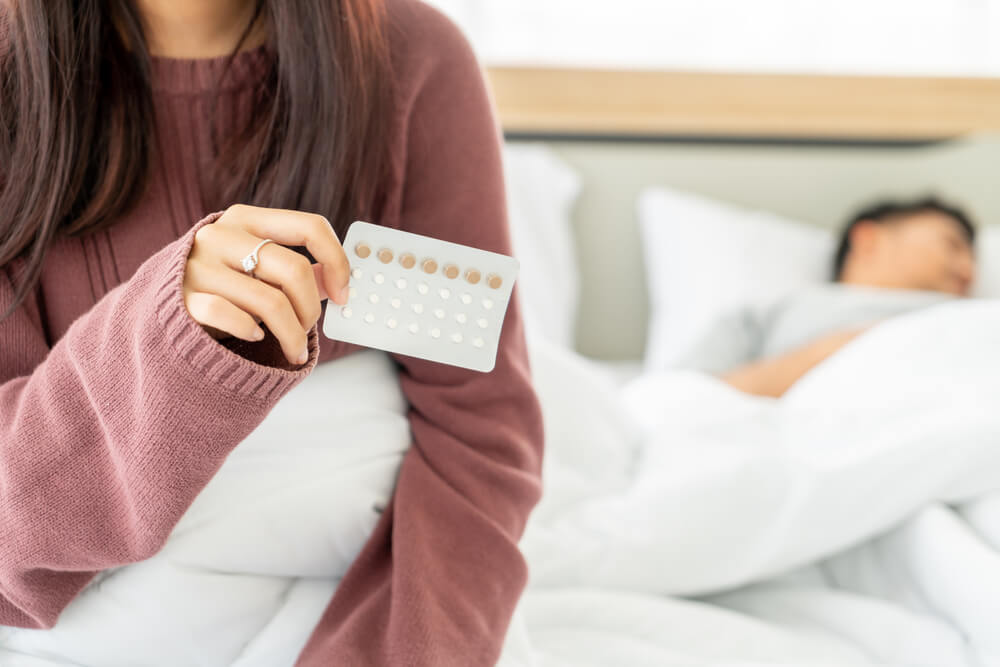When considering a new method of birth control, such as birth control pills, many women may worry that the new contraceptive routine will interfere with their everyday lives, causing unwanted side effects, such as decreased sex drive.
And while it’s true that nearly all forms of birth control will produce side effects to a certain degree, it’s not that one-sided. This is why the experts at ACE OBGYN have come up with this comprehensive article to shed more light on the effects of contraceptive female hormones on sex drive and the female body, in general, regarding side effects.
Does Birth Control Affect Libido?
Before we get started, it’s important to know that some of the side effects caused by these female hormones are only minor and even beneficial. They can make your periods lighter, improve your acne, and give you better control over your reproductive health.
Still, we must answer the question: does birth control affect libido? In short, every type of birth control can affect your sex drive, but the effects and the extent will depend on the method used,
- Condoms might lead to discomfort and vaginal irritation.
- Spermicide may cause irritation and itching.
- Hormonal birth control or the use of female hormones may decrease the user’s sex drive.

Is It All About Your Libido?
While the most critical aspect of birth control pills and other contraceptives is to prevent pregnancy, when it comes to sexuality, sex drive is an important thing to take into account.
Also, it’s important to remember that libido is rather complex. Some women may get physically aroused fast, but feeling pain, irritation, or discomfort may affect their experience.
On the other hand, some women may have a high libido but find it challenging to get aroused. They may also get aroused quickly but find sex painful or not reach sexual climax.
To that end, female hormone-based birth control options might increase those issues, but it’s not the case for everyone. These products will have a different effect on every user, and some may even notice an increase in their sex drive.
Libido and Female Hormones: Assessing The Numbers
A review from 2013 looked at findings from 36 separate studies that focused on the links between libido and combined oral contraceptives, i.e., pills with both female hormones, progestin and estrogen.
Out of the 8,422 participants, 1,238, or about 15%, have reported a decrease in sexual desire, and roughly 21%, or 1,926 people, reported an increase. The rest of the participants have experienced no changes.
Another review from 2016 looked at the results of 103 studies that researched the effects of birth control methods on sexuality. They come to the following outcomes:
- Hormonal IUDs may lead to less pain during intercourse and, thus, may increase sex drive.
- Vaginal rings are linked to increased libido, sexual satisfaction, arousal, and improved orgasms.
- Copper IUDs may also increase satisfaction with sex, arousal, and libido, along with hormonal devices.
- Internal condoms will increase sexual comfort and improve lubrication.
- Implants may boost sexual satisfaction and boost arousal.
Hormonal Birth Control and Sex Drive
These methods work by releasing pregnancy-preventing female hormones into the body. These may lead to some sexual and physical side effects in some users, including:
- Bloating
- Fatigue
- Dizziness
- Bloating
- Weight gain
- Depression
- Tender or painful breasts
- Anxiety
- Changes in the intensity and frequency of your orgasms
- Cramping
- Spotting or irregular periods
- Yeast infections
- Increased vaginal dryness
All in all, each of these side effects can potentially decrease your libido, i.e., make you less interested in sex.
Still, there’s no resounding expert consensus on how female hormone-based contraceptives affect the libido. Still, many women experience changes, at least to some degree.
Libido and Nonhotmonal Birth Control
Nonhormonal contraceptives won’t cause any emotional and physical changes related to female hormones. Still, they may change the user’s libido to some degree.
For example, due to the fact that these options are often less effective than hormonal contraceptives, women worry about unplanned pregnancies, and the anxiety and stress may leave them less interested in sex.
Some methods, such as spermicide usage, have been linked to itching and may increase the risk of developing urinary tract infections, which may decrease libido.
Is It All About Birth Control?
While birth control methods can affect your libido, they aren’t the only things that can dampen your sexual desires.
Here are other factors that you should take into account:
- Age
- The feelings you have for your partner
- Whether you enjoy the type of intercourse, you are having
- Problems in your relationship
- Stress-that’s related to work, school, family, and friends.
- Digestive problems, sleep issues, diabetes, and other health concerns
- Depression or anxiety
On that note, it’s normal to experience shifts in your sex drive during your menstrual cycle as well.
Sometimes, it’s hard to tell whether the decreased libido is caused by your birth control method or by something else. Still, suppose you don’t have any stress-related problems, relationship issues, medical conditions, or sleep problems, and you like spending time between the sheets with your partner. In that case, chances are, your contraceptives are to blame.
How To Increase Libido On Birth Control?
Having a decreased desire for sex might be alarming, but there are a few steps you can do to increase your libido, even on birth control.
Consider the following tips:
Communicate With Your Partner
Sharing your concerns regarding your libido with your partner is always a good idea. Together, you may come up with ideas that can help you increase your sex drive. Role-playing, dirty talk, and living out your sexual fantasies may help.

Introduce Change
As hinted above, some experimentation may help you spark your desires again. Use sex toys, watch or read erotica – try out new things that might help you fuel your libido.
Going Solo
Masturbation can help you learn more about your body. It can help you get a better understanding of what sensations you leek and boost your arousal.
Take Your Time
Take your time before having sex. Get yourself in the mood with foreplay, masturbation, cuddling, kissing – ease yourself into it. Jumping right into penetrative sex when you simply don’t feel like it won’t make things better.
Rule Out Health Concerns
Other medications you are taking might also interfere with your sex drive. Also, some medical conditions may decrease your libido. That said, consider talking to your healthcare professional, especially if you have other physical symptoms or deal with insomnia or mental health issues like depression or anxiety.
Don’t Get Discouraged
For the most part, decreases in sex drive aren’t related to contraceptive products; rather, they stem from the everyday stresses of life. Sitting down with your partner and voicing your concerns and feelings can be enough to bounce back.
On the other hand, a loss of sex drive can be an issue pertaining to other medications you might be taking or other health issues.
And lastly, if the culprit is your birth control, you can always reach out to an expert to find another method that would suit you better. That said, you can always contact us and schedule an appointment if you want to explore your options.
Call us today.

